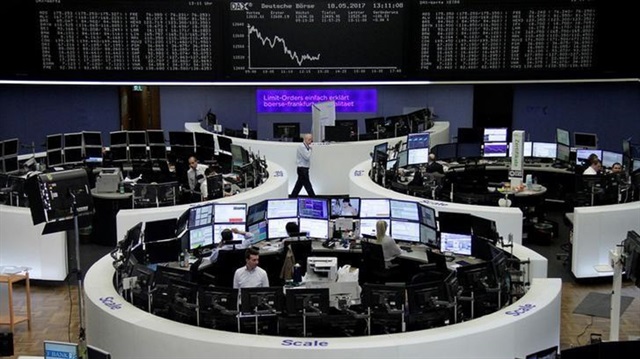
The euro surged to a six-month high on Monday after Angela Merkel said it was "too weak" for Germany, though rumblings in Spain, Britain and Brussels reminded investors that Europe still has plenty of uncertainties to deal with.
A one-month high for oil on hopes of OPEC output curbs had helped give Asian shares their best session in weeks but Europe had struggled to maintain the momentum and Wall Street also looked set for a subdued start.
Investors continue to focus on the problems that have engulfed President Donald Trump's U.S. administration over the last week but there were other familiar and not so familiar issues to deal with too.
Currency markets flipped 180 degrees as Merkel, during a trip to a Berlin school, made a surprise reference to the euro being "too weak" due to the European Central Bank's ultra-low interest rates and money printing programme.
Up until that point the single currency had been in the red but the comments saw it swiftly climb to a six-month high $1.1250 and bring the morning's rebound in the dollar to an abrupt halt.
"The thing with euro/dollar is that you have quite a positive mood on the euro at the moment," said ABN Amro FX strategist Georgette Boele.
"And when Merkel makes comments that the euro is probably too low then this is taken as another positive reason to push it higher."
Stocks and European bonds remained soft, however, as one of the most outspoken critics of Mariano Rajoy's ruling party and Spain's austerity policies returned to front the opposition Socialists.
Britain's pound was also in the firing line, back to $1.30 , as polls showed the country's election race tightening and its chief Brexit negotiator again threatened to walk away from EU exit talks unless the bloc eased its demands.
"Last week was all about U.S. uncertainty but we have had a reminder that Europe still has plenty of uncertainty too," said Alvin Tan at Societe Generale.
The euro's rally meant the dollar was pulled back to the six-month low it hit last week after concerns about Donald Trump's firing of a former FBI head and his administration's links to Russia had given the greenback a drubbing.
The dollar index, which tracks the U.S. currency against a basket of six major rivals, dropped from 0.2 percent higher to 0.2 percent lower to add to a fall of around 6 percent since the start of the year.
Net long positioning on the euro versus the dollar rose to its highest in more than three years last week, Commodity Futures Trading Commission data showed on Friday.
But Citi's 'economic surprise' indicators show the recent bout of negative U.S. economic surprises may now be bottoming out. Analysts are also waiting for this week's release of the Federal Reserve meeting minutes.
"Our bias is still dollar positive," said Adam Cole, currency strategist at RBC Capital Markets in London.
Oil also rose on Monday, bolstered by confidence that top exporters will at least agree to extend supply curbs at an OPEC meeting this week, with suggestions that the cuts could even be deepened.
Brent crude was up 40 cents at $54.00 a barrel, with U.S. light crude 38 cents at $50.71. Both benchmarks have climbed more than 10 percent from lows hit earlier this month.
"The decision (to extend cuts) seems to be almost a done deal," said Bjarne Schieldrop, chief commodities analyst at SEB Markets. "There seems to be a very high harmony in the group."
Another familiar European story was also back on the radar.
Euro zone finance ministers and the International Monetary Fund will meet later on Monday to try to nail down a deal on Greek debt relief that balances the IMF's demand for a clear "when and how" with Germany's preference for "only if necessary" and "details later".
Without the loans, Greece would be likely to default. Athens, meanwhile, wants a deal to help it return to market financing when the country's latest bailout, the third since 2010, ends in mid-2018.
In Asia, MSCI's broadest index of Asia-Pacific shares outside Japan enjoyed its best session in a month, helped by gains in Australia and Hong Kong stocks despite a mass downgrade of bank credit ratings in the former and new property market regulations in the latter.
Chinese stocks were the only laggards in the region, with mainland indices ending 0.5 percent in the red as concerns also simmered about another dip in the economy.
The bounce in Asian stocks this year has helped MSCI's closely followed emerging stocks index notch up gains of more than 17 percent compared to 8 percent for the wider 'all-world' index which is near a record high.















